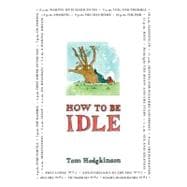
The New copy of this book will include any supplemental materials advertised. Please check the title of the book to determine if it should include any access cards, study guides, lab manuals, CDs, etc.
The Used, Rental and eBook copies of this book are not guaranteed to include any supplemental materials. Typically, only the book itself is included. This is true even if the title states it includes any access cards, study guides, lab manuals, CDs, etc.
I wonder if that hard-working American rationalist and agent of industry Benjamin Franklin knew how much misery he would cause in the world when, back in 1757, high on puritanical zeal, he popularized and promoted the trite and patently untrue aphorism "early to bed and early to rise, makes a man healthy, wealthy and wise"?
It is a sad fact that from early childhood we are tyrannized by the moral myth that it is right, proper and good to leap out of bed the moment we wake in order to set about some useful work as quickly and cheerfully as possible. In my own case, it was my mother whom I remember very clearly screaming at me to get out of bed every morning. As I lay there in blissful comfort, eyes closed, trying to hang on to a fading dream, doing my utmost to ignore her shouting, I would start to calculate the shortest time it would take me to get up, have breakfast and go to school and still arrive with seconds to spare before assembly started. All this mental ingenuity and effort I expended in order to enjoy a few more moments of slumber. Thus the idler begins to learn his craft.
Parents begin the brainwashing process and then school works yet harder to indoctrinate its charges with the necessity of early rising. My own personal guilt about feeling actually physically incapable of rising early in the morning continued well into my twenties. For years I fought with the feelings of self-hatred that accompanied my morning listlessness. I would make resolutions to rise at eight. As a student, I developed complex alarm systems. I bought a timer plug, and set it to turn on my coffee maker and also the record player, on which I had placed my loudest record, It's Alive by The Ramones. 7:50 a.m. was the allotted time. I had set the record to come on at an ear-splitting volume. Being a live recording, the first track was prefaced by crowd noise. The cheering and whooping would wake me, and I'd know I had only a few seconds to leap out of bed and turn the volume down before Dee Dee Ramone would grunt: "one-two-three-four" and my housemates and I would be assaulted by the opening chords of "Rockaway Beach," turned up to 11. The idea was that I would then drink the coffee and jolt my body into wakefulness. It half worked. When I heard the crowd noise, I would leap out of bed and totter for a moment. But what happened then, of course, was that I would turn the volume right down, ignore the coffee and climb back to the snuggly warm embrace of my duvet. Then I'd slowly come to my senses at around 10:30 a.m., doze until twelve, and finally stagger to my feet in a fit of self-loathing. I was a real moralist back then: I even made a poster for my wall which read: "Edification first, then have some fun." It was hip in that it was a lyric from hardcore punk band Bad Brains, but the message, I think you'll agree, is a dreary one. Nowadays I do it the other way around.
It wasn't until many years later that I learned that I was not alone in my sluggishness and in experiencing the conflicting emotions of pleasure and guilt which surrounded it. There is wealth of literature on the subject. And it is generally written by the best, funniest, most joy-giving writers. In 1889, the Victorian humorist Jerome K. Jerome published an essay called "On Being Idle." Imagine how much better I felt when I read the following passage, in which Jerome reflects on the pleasure of snoozing:
Ah! how delicious it is to turn over and go to sleep again: "just for five minutes." Is there any human being, I wonder, besides the hero of a Sunday-school "tale for boys," who ever gets up willingly? There are some men to whom getting up at the proper time is an utter impossibility. If eight o'clock happens to be the time that they should turn out, then they lie till halfpast. If circumstances change and half-past eight becomes early enough for them, then it is nine before they can rise. They are like the statesman of whom it was said that he was always punctually half an hour late. They try all manner of schemes. They buy alarm clocks (artful contrivances that go off at the wrong time and alarm the wrong people) ...How to Be Idle. Copyright © by Tom Hodgkinson. Reprinted by permission of HarperCollins Publishers, Inc. All rights reserved. Available now wherever books are sold.
Excerpted from How to Be Idle by Tom Hodgkinson
All rights reserved by the original copyright owners. Excerpts are provided for display purposes only and may not be reproduced, reprinted or distributed without the written permission of the publisher.